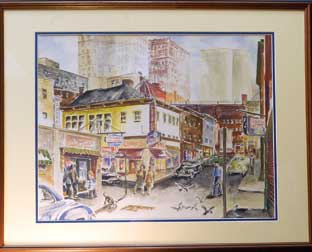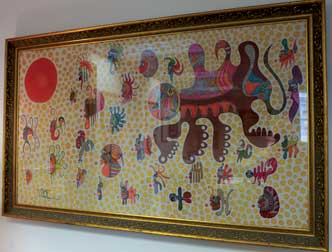Black History Month Feature: Common Pleas Judge Joseph K. Williams III Crafts a Life Based Upon Preparation and Opportunity
 Judge Joseph K. Williams III
Judge Joseph K. Williams IIIThe hallways leading to the courtroom of Allegheny County Court of Common Pleas Judge Joseph K. Williams III offer a cacophony of human drama: lawyers talking in hushed tones on cell phones, young parents struggling to keep bored toddlers under control, handcuffed defendants heading to trial with a police officer on either side, worried family members anxiously waiting for their case to be called.
But enter Williams’ office just off his courtroom, and the tone is quiet, orderly—quite a contrast to the human free-for-all outside. Many of the office decorations represent the 160 years of Williams family history in in the Manchester area on Pittsburgh’s North Side, and of the solid upbringing he received there. Art work—including a lithograph of the Saint-Gaudens Civil War sculpture of the Massachusetts 54th Infantry from his grandfather’s vestibule, another of Market Square during the 1950s, as well as a pen-and- ink work by the recently deceased Pittsburgh artist, T-More —adorns the walls. All of art, Williams said, helps him to keep his “perspective of the world I came from.” An elegant Diamond Bijan Kurdish carpet cushions the surface of an immaculate mahogany desk that features a clock, some neatly stacked notes, a pen, and a Bible, open to Ecclesiastes 3:1: “To every thing there is a season, and a time to every purpose under the heaven …”
Williams laughs heartily when asked whether he reads his Bible often. “I read it a lot more since I’ve become a judge,” he says quickly, adding that he was reading Ecclesiastes recently as he reflected upon his birthday. “I get introspective around my birthday each year … I assess the issues that are important to me. I start measuring where I am on some type of meter.”
By just about anyone’s measurement, though, Williams has excelled. Born and raised in Manchester with three brothers and two sisters, Williams grew up in a house on Decatur Street, an alleyway that also was called home (at different times) by Common Pleas Judge Michael E. McCarthy and Pennsylvania Superior Court Senior Judge Robert E. Colville. The Williams home housed an extended family, with relatives and friends coming, staying, and going all the time. And in a twist of familial fate, Williams’ paternal grandfather worked as a janitor in the Allegheny County Courthouse, cleaning the floors of what would one day become Williams’ courtroom. Williams’ father was a building engineer in the Federal Building, just a few blocks away, on Grant Street, Downtown.
“Each time I put my robe on, I’m putting it on for the three of us,” Williams says.
Living in a working-class neighborhood with hardworking parents, Williams attended the Pittsburgh Public Schools. A turning point in his academic life came early and incredibly: In 10th grade, he won an academic scholarship that allowed him to attend Yale University during his junior and senior years of high school.
It was 1968, and Williams left a politically charged Manchester to head northeast to New Haven. For an African American teenager from Manchester, going to Yale “was such a change of scenes and a change of my reality. For the first time, I began to see what I could do,” Williams says. His professors included, among others, Roots author Alex Haley and A. Bartlett Giamatti, a well-known scholar and professor of comparative literature who went on to become nationally renowned as president of Yale and then Commissioner of Baseball. Truman Capote was frequently sighted on campus.
“It was at Yale that I learned for the first time that ‘luck’ happens when preparation and opportunity converge,” he said. It was one of many sayings from his father, Joseph Williams Jr., that still stick with the judge today.
Williams returned to Pittsburgh after finishing high school at Yale; he earned his bachelor’s and master’s degrees in psychology from Carnegie Mellon University and the University of Pittsburgh, respectively. In 1985, he graduated from Duquesne University School of Law.
 Williams' courthouse office is filled with personal keepsakes, including artwork that the judge said keeps him mindful of his family roots in Manchester. Above, a painting of Market Square during the 1950s.
Williams' courthouse office is filled with personal keepsakes, including artwork that the judge said keeps him mindful of his family roots in Manchester. Above, a painting of Market Square during the 1950s.The path leading from law school to his 2008 donning of judicial robes included devoting 24 years to a private, Manchester-based legal practice, marrying and moving out to a farm in Verona 22 years ago to raise his family, and pursuing a host of volunteer work and personal hobbies. Williams has developed several historically significant properties in Manchester, including an 1884 Queen Anne home, which housed his legal offices on the corner of Pennsylvania Avenue and Chateau Street. He is also a collector of Persian and Caucasian carpets and was once a serious dog breeder and competitor in the international dog sport of Schutzhund (testing and training dogs for police-type work). His expertise and dedication to the latter helped him pay his way through law school.
Williams took the oath of office for his judgeship on Nov. 10, 2008, after he was appointed by then-Governor Edward Rendell to fill an unexpired term on the Court of Common Pleas. In November 2009, Williams was elected to a 10-year term and continues to serve on the Criminal Division bench.
He said that serving on the bench “feels very natural and as though all the pieces have come together.”
The teachings of his parents and grandparents have given Williams an unerring sense of right and wrong. “My father used to tell me that ‘you have to move to the light. No matter what people do to maintain the status quo, you have the responsibility to do what’s fair and just.’”
 Also on display in Williams' office: a pen-and-ink work by the late T-More that was a gift from an owner of the Hill District's Crawford Grille.
Also on display in Williams' office: a pen-and-ink work by the late T-More that was a gift from an owner of the Hill District's Crawford Grille.A lifetime of legal work and observing life itself have shown him the frailty in us all—and the amazing ability of some to recover from bad mistakes. Williams said he frequently tells defendants standing before his bench that “we all fall down from time to time. But the issue is: ‘Do you learn from it?’ Some of us learn from falling, others curl up in a fetal position and stay down for the rest of their lives.”
Meanwhile, outside the quiet retreat of Williams’ office, the courtroom is filling up. He gets up from his desk, gathers his robe, and heads through a side door into the cacophony that awaits: attorneys talking to his clerks, families whispering among themselves, and everyone waiting anxiously for the judge to be seated at the bench.
Other Stories From This Issue
On the Freedom Road

Follow a group of Pitt students on the Returning to the Roots of Civil Rights bus tour, a nine-day, 2,300-mile journey crisscrossing five states.
Day 1: The Awakening
Day 2: Deep Impressions
Day 3: Music, Montgomery, and More
Day 4: Looking Back, Looking Forward
Day 5: Learning to Remember
Day 6: The Mountaintop
Day 7: Slavery and Beyond
Day 8: Lessons to Bring Home
Day 9: Final Lessons

